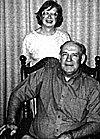 The current renaissance in Napoleonic studies and his passion for Napoleon's nemesis -- the Duke of Wellington -- are explained by Donald D. Horward, internationally recognized specialist in Napoleonic military history and founder of the renowned Institute on Napoleon and the French Revolution at Florida State University. Horward also provides insight into the opportunities and lifestyle of academics committed to studying Napoleonic history.
The current renaissance in Napoleonic studies and his passion for Napoleon's nemesis -- the Duke of Wellington -- are explained by Donald D. Horward, internationally recognized specialist in Napoleonic military history and founder of the renowned Institute on Napoleon and the French Revolution at Florida State University. Horward also provides insight into the opportunities and lifestyle of academics committed to studying Napoleonic history.
At right, Horward and Annabel--the power behind the military history "powerhouse?"
A1955 graduate of Waynesburg College, Pennsylvania, Professor Donald D. Horward went on to do graduate work at Ohio University and the University of Minnesota (Ph.D., 1962). He has taught at Florida State University since 1961, being major professor to more Ph.D.s in Napoleonic history than anyone else in the United States and earning five teaching awards. Horward has been recognized internationally for his contribution to the history of the Napoleonic period by the Czech Republic, French, Spanish and Portuguese governments, as well as by SHAPE Military History Society, NATO. He has also been decorated by the U.S. Army and recognized by the U.S. Marine Corps.
Horward and his wife Annabel, who is equally well-known to conference attendees and the graduate students who seem to follow the couple almost everywhere, have been married thirty-nine years. When not traveling in Europe, they spend their summers at Sandusky, Ohio, on Lake Erie, at Cedar Point, where passing motorists and boaters can readily identify chez Horward by the French tricolor waving from the flagpole in the center of the lawn. When encountering Howard, be prepared for his bubbly enthusiasm for Napoleonic history.
Dr. Horward, do you administer special programs or an institute at Florida State University that we ought to publicize? HORWARD: Yes, two things: the Institute on Napoleon and the French Revolution [INFR] which was founded in 1990, and the FSU library collection on Napoleon and the French Revolution.
When did you start to build the program at Florida State? HORWARD: The Institute really started with my first graduate student, Gordon Bond, who finished his M.A. in 1963 and his Ph.D. in 1966. He was the beginning of a stream of students. In 1990, the INFR was formalized by the Florida Board of Regents. The College of Arts and Science established a small budget to support the Institute, along with two fellowships in Napoleonic studies. The INFR also enjoys private support, from a number of people interested in the Napoleonic period.
Why did the Florida Board of Regents and the Florida Legislature create the INFR? HORWARD: They realized that FSU almost doubled the production of any other university in the number of Ph.D.s granted in this field. Former students of the institute now teach throughout the country -- from Utah to New York, from Michigan to Louisiana. For example, at a recent conference at Savannah, Georgia, almost one-fourth of the papers were by former or current FSU students. Other schools preparing students in the Napoleonic period seem to have declined during the last decades so FSU has filled the gap over the years.
And the FSU library collection? HORWARD: We began to build the collection right after my arrival at FSU. It had about 200 volumes on Napoleon and the French Revolution in 1962. We had various problems over the years. When library funds were frozen in the 1970s -- due to the orange crop freezing -- we were able to gain support from the Legislature to include a line-item in the budget for the FSU library collection on the French Revolution and Napoleon. Today, we have about 17,000 titles or 20,000 volumes in the collection! The university has literally hundreds of books held by no other U. S. libraries. In 1972, with the aid of my dear friend, Jean Clavreuil, the premier Paris book seller of Napoleonic works, FSU bought the Napoleonic library of Ernest Auguste, the last King of Hanover and Duke of Cumberland. The irreplaceable Napoleon and the French Revolution Collection is now protected in the Special Collections Division of the Strozier Library at FSU, where people come even from Europe to use it. Its value is in the millions.
You published a bibliography of the FSU Collection several years ago? HORWARD: Yes, the bibliographical Guide, a 500-page book, is still in print and available from the Institute on Napoleon and the French Revolution, and at $10.00 a copy, a great bargain. It is being updated now; the new edition should be over 1,000 pages when it appears in a few years.
I know that you've received many special awards and recognition for your work. Would you care to comment on your proudest achievements? HORWARD: The most important are the "Chevalier", Ordre des Palmes Academiques (France) for work in the Napoleonic period ( 28 October, 1984), which was upgraded when I was made "Officer" of the order (September, 1991). This order was established by Napoleon in 1808 for contributions to historical and literary achievement. Also of major significance was to be named a grand officer of the Ordem do Infante Dom Henrique (Prince Henry the Navigator) and decorated on national TV by the President of Portugal, Dr. Mario Soares.
HORWARD: Many changes have occurred in the profession since I left Minnesota. In 1961 prospects in securing a teaching position at a university were excellent; most of us had several firm offers of employment. We knew we would be employed after we had completed our degrees. Today students have no such assurances. They go into the field because they are committed to teaching and love the field. They come to the university for $7,800 a year, to serve as an assistant, teach classes; complete their course of study, and prepare for their master's or doctoral exams. Often with a spouse and children, they take out student loans to supplement their assistantships and carry their families through the summers. Nevertheless, when they complete their degrees, there is no guarantee that they will land a job. Some do and others do not, depending on a hundred different factors. In this age, one of a major professor's most significant and frustrating duties is helping his/her student find a job. Success can be exhilarating to the student and his mentor, but failure can be depressing to both. Today, I regard job placement as probably the second most important function of a major professor.
Another significant change that has taken place in our field is the redirection of emphasis. There are still many students working on military, diplomatic, and political topics in the Napoleonic field, but others are concentrating on gender, religion, economics, and society, on both the national and regional level. Students are pouring over village records, parish rolls, hospital and police reports as well as the correspondence between Napoleon and his ministers or marshals. For example, three of the young women working in the Institute are pursuing their research on gender, the treatment of Blacks, and propaganda. However, this does not imply that women do not work on military and diplomatic topics in the Napoleonic field; five of our female graduates worked specifically in military and diplomatic topics. Another change in the field has been the greater availability of research funds to pursue research in Europe. In the past it was difficult to secure funds to spend a summer doing research since scholarships were limited and student loans were unheard of. Today, it is possible for doctoral students to receive funds from their university, some foundation, a governmental agency, or even from private donors. In 1994 a generous supporter of our program, Dr. Proctor Jones, provided funds to rent a Paris apartment so three of our students could spend three months in the archives. Last year he provided funds for a larger apartment for five students. Another generous contributor, Margaret Armistead, provided funds for two of our female graduate students to spend a month there. This year and last, she helped support four students to attend a meeting in Europe. This summer, Dr. Ben Weider sponsored four FSU doctoral students who presented papers at the International Napoleonic Society conference in Alessandria, Italy.
Change has also come in the composition of our graduate students. Over the past four years, six women have become members of the Institute. A total of six females have already graduated with the Ph.D., four with the M.A., and three are currently working on doctorates. Although students initially came from the southeastern region of the country, over the last decade they have represented such schools as Ohio State, Notre Dame, Bowdoin, Rhode Island, Purdue, Minnesota, Wisconsin, West Point, North and South Carolina, etc., reflecting a national interest in Napoleonic Studies. Another change has been the mobility of students to travel abroad to complete their research, both manuscript and topographic. No matter what specific topics my students choose, they must visit the sites where pertinent events occurred since writing about events or personalities without on-site research places a scholar at a distinct disadvantage. Personally, my twenty trips to Europe, from Lisbon to Moscow, Hamburg to Elba, have provided valuable insights for my understanding of the period. Another major difference has been the dramatic change in the policies of the various public and private archives and libraries in Europe. When I first worked in the Portuguese military archives, I was required to examine the catalogue in a hall but was not admitted to the reading room. It took the intervention of the Gulbenkian Foundation and the former Portuguese ambassador to the U.S. to get me in. Today, the archives of Western and Eastern European are open to any serious student with a letter of introduction. Within the past two years the Institute has had a total of thirteen members working in the state archives of Western and Eastern Europe. In addition, various prominent families are now willing to admit scholars to utilize their family papers. For example, Jeanne Ojala worked in the family papers of the Colbert family; Kyle Eidahl spent part of a summer working in the Oudinot family papers; Sue Connor examined the private papers of the Marquis de Balincourt, lover of Madame Junot; Mike Leggiere was given access to the unpublished Bulow papers; Llew Cook was sipping tea with Prince Schwarzenberg last year after laboring in the family archive; Brian De Toy examined George Berkeley personal papers at Berkeley Castle; and a dozen other students have labored in the Wellington Papers at the University of Southampton. I should also acknowledge that five years after my first book was published, the Massena family welcomed me to their apartment and the family archives where I worked daily for over three months. It was an experience I will never forget. As a bonus, we became fast friends and today I count Victor Massena, a frequent visitor to Tallahassee, among my valued friends.
Have the new societies had a significant impact on the French Revolutionary field, too? HORWARD: Yes. An extremely important change that has taken place over the past two decades has been the establishment of organizations dedicated to Napoleonic Studies. When I entered the field there were no American organizations that encouraged the study of this period. However, in February of 1971 the Consortium on Revolutionary Europe was born at the University of Georgia under the leadership of Lee B. Kennett. Organized by five southeastern universities including Georgia, South Carolina, Florida, LSU, and FSU, the Consortium has held annual meetings for the past twenty-seven years. The conference has increased from ten papers and seventy-five participants in 1971 to over 130 papers and 300 participants in 1989. The publication of the papers has grown from a soft-back publication of 130 pages to a hardback volume of over a thousand pages. This has encouraged distinguished scholars, as well as aspiring students, to attend the meetings and present the results of their research. Consequently almost fifty percent of the dissertations completed on the Napoleonic period have been completed in the last twenty years, thanks, to a large degree, to the encouragement of the Consortium.
HORWARD: FSU has hosted the Consortium on Revolutionary Europe four times since 1974. To expand the scope of the meeting, I arranged to include several sessions on music and the arts. In 1980, the keynote address included a piano concert of Beethoven's revolutionary sonatas followed by a paper on Napoleon and Beethoven. In 1986 we enlisted the aid of the entire School of Music to perform a concert that included a symphonic band, a full orchestra, and a chorus of ninety voices. The concert opened with music of the French Revolution performed by the symphonic band on period instruments; noteworthy was the original rendition of Marche des Marseillois (1792). After the intermission, the FSU symphony orchestra performed Napoleon's original Coronation Mass by Giovanni Paisiello; this was the third performance of the music since 1804 and the American premiere. (The music had been stacked away in the chapel at Versailles for almost a century and was rediscovered in the 1960s in the Bibliotheque National.) The Mass was greeted with a standing ovation by an audience of 700, including several French diplomats, and the concert ended with selections of Haydn's Nelson Mass, amid cheers and another standing ovation!
However, for me, the events at the Bicentennial Congress of the French Revolution, held in Tallahassee in 1989 were the most memorable. For this auspicious occasion, I enlisted the support of almost every element of the University as well as the French ambassador, His Excellency Michel Lennuyeux-Comnene, and his wife. Performing in a packed church, the concert included the symphonic band performing selections written and performed during the French Revolution, including the Sousa rendition of the Marseillaise. The intermission was followed by Haydn's monumental Misa in Tempore Belli (Mass in Time of War), written as Napoleon's troops advanced on Vienna in 1797. During the second evening of the conference, almost 300 participants attended the School of Theater's superb production of The Death of Danton, written by Georg Buchner in 1835. This was followed by a gala reception at the University Art Gallery where two floors were packed with rare books from the French Revolution and Napoleon Collection of the Strozier Library and artifacts of the period. The evening ended with members of the School of Dance performing dances of the Empire in period costumes. I cannot recall any time when I was more proud of the University; we were able to mobilize all of FSU's resources to present a spectacular celebration to commemorate the Bicentennial of the French Revolution. The university President and Provost, Bernie Sliger and Gus Turnbull, attended many of the functions and seconded my every effort, and at the final banquet, Charlie Reed, the Chancellor of the State University System, took the lectern to commemorate the Revolution. For me, our Napoleonic program had helped to produce what I consider one of FSU's finest hours. We did not know it at the time, but of the 549 meetings held throughout the world to commemorate the Bicentennial of the French Revolution, the conference at FSU turned out to be second in size and publication only to the World Congress held in Paris.
What other organizations besides the Consortium help the Napoleonic field thrive? HORWARD: The recently organized Napoleonic Alliance, headquartered in Chicago, stimulates interest in the Napoleonic era. It also publishes a Gazette and sponsors an annual meeting and a European tour of Napoleonic sites. Another important organization, the Napoleonic Society of America, founded by Robert Snibbe in 1983, encourages the study and understanding of the Napoleonic period. It sponsors an annual meeting and literary award, publishes its Bulletin and the Proceedings of the Society, providing a means of publication for those interested in the First Empire. The International Napoleonic Society was established by Dr. Ben Weider of Montreal, Canada about three years ago. Represented by two hundred scholars from fifteen nations, the Society publishes a journal, organizes international congresses, sponsors literary awards for both accomplished scholars and aspiring graduate students, and encourages research and teaching in the field of Napoleonic history. Scholars are recognized for exceptional contributions with the Legion of Merit. It is noteworthy that in June 1997 the INS joined forces with the city and provincial governments to convene an extraordinary six-day congress in the city and citadel of Alessandria, Italy. In addition, other Napoleonic societies are scattered in almost every nation of Europe and as far east as Australia, encouraging the study of the First Empire. Many of these associations publish journals, bulletins, papers, etc., encouraging further publication in the field. And of course, last but not least, the former publication Empires, Eagles and Lions has been transformed into the impressive new magazine Napoleon, in which this interview appears.
Would you say, all this momentum constitutes a Napoleonic renaissance? HORWARD: Yes. There has been a true renaissance in Napoleonic studies during the past decade. In addition to the annual meeting held in the U.S., there have been several international congresses held throughout America and Europe to encourage studies in the field. In 1984 a congress, sponsored by the Spanish and Portuguese governments and FSU was held at Ciudad Rodrigo, Spain, and Almeida, Portugal, to commemorate the Peninsular struggle against Napoleon. This was followed by the International Congress in 1987 on the Life and Times of the First Duke of Wellington at Southampton under the sponsorship of University of Southampton and Florida State University.
Two years later, another international congress was held in Lisbon, Portugal, on the Iberian Peninsula during the Revolutionary Period under the sponsorship of FSU, the Universities of Southampton and Manchester, the Gulbenkian Foundation, the British Historical Society of Portugal, and the Portuguese army.
Currently, plans are underway in England to convene the Second International Congress on the Life and Times of the First Duke of Wellington at Hartley Library of Southampton University in 1998; and Florida State University will again host the Consortium meeting in 1998, followed by the College of Charleston/University of South Carolina in 1999. So in considering the future of studies in the Napoleonic period, thanks to dedication and enthusiasm of many people throughout the world, its future seems assured for decades to come.
What motivated your original interest in history in general and in French Revolutionary/Napoleonic history per se? HORWARD: When I was maybe fifteen years old, a sophomore in high school, I gave a little report on the trial and death of Louis XVI. I began to read about the Revolution and Napoleon. That year I read Emil Ludwig's Napoleon followed by a volume on Wellington by Phillip Gaudella.
Did you plan your career or did it result from a series of accidents? HORWARD: I went to Waynesburg College in Pennsylvania -- a history major right off. I continued my reading on Napoleon. My first truly inspiring professor was Arthur Mintier, a Michigan graduate. He suggested I apply for financial support to graduate school. Another mentor was Carl Gustavson at Ohio University, a student of Frederick Jackson Turner and a graduate of Cornell. He encouraged me to apply to Minnesota, and there I had the opportunity to work with Harold Deutsch and John Bowditch.
How did you land your first job as a historian and how long did it take? How old were you then? HORWARD: Age twenty-six, working on my dissertation, I attended the American Historical Association meeting in New York City. There were several jobs available in my field. Someone mentioned that FSU was interviewing candidates in the Revolutionary and Napoleonic period. I met the chairman for a few minutes in the hotel lobby and then drove 1,400 miles through snow back to Minnesota. Although I had not seen the campus of 9,000 students, they offered me $5,800 a year -- $600 less than my wife was making in Minnesota teaching third grade! At that point, I had never been farther south than Cincinnati, Ohio.
What experience have you had with the military? HORWARD: My most memorable experiences with the military have been my twenty-year association with the U.S. Military Academy at West Point. First as a visiting lecturer and then as holder of the Chair of Military History in 1986-87, I had a most enjoyable opportunity to work with both the faculty and cadets. Since then, I have taken part in various West Point programs as a guest lecturer almost yearly. In addition I have directed the graduate work of eleven army officers who are now doctoral students or graduates, specializing in Napoleonic Studies; each of them will serve on the faculty there for three years before returning to their units. In addition, since 1989, I have been a guest lecturer at the Command and Staff College, the School of Advanced Warfighting, and the War College of the U.S. Marine University at Quantico, Virginia. During the last four years, I have been fortunate to hold the Chair of Military Affairs at both the War College and the School of Advanced Warfighting at Quantico. It was also gratifying to be invited to speak on several occasions at the Naval War College at Newport, Rhode Island, and the Army War College at Carlisle, Pennsylvania. Finally, and certainly not least, I was fortunate to hold the Conquest Chair in Humanities in 1984 at Virginia Military Institute to teach Napoleonic history. Based on these contacts, I have developed a rather unique appreciation of Napoleon and his impact on the transformation of warfare. Regarding the foreign military schools, it was a pleasure to give the "Napier Address" at the Royal Military Academy, Sandhurst; a series of addresses at the Czech Military Academy over a four year period; a presentation to the German Command and Staff College at Hamburg, and addresses at both SHAPE Headquarters in Mons, and NATO Headquarters in Brussels; but the most exciting experience was a series of speeches for the officers of the Berlin Brigade during a three-day staff ride to the battlefield of Austerlitz in the Czech Republic. At each of these schools, Napoleon and his impact upon Europe was the basic theme of my presentations.
HORWARD: Mine probably should be, "Napoleon and Wellington". Almost unconsciously, my whole career has evolved in a comparison of Wellington and Napoleon. English writers dwell on the undebatable success of their armies in the Peninsula, while the French, for the most part, ignore the Peninsular War. It's amazing how closely their careers parallel each other. Napoleon implemented what are referred to today as "the principles of war" during the Italian Campaign of 1796; Wellington did the same in Spain between 1808 and 1812. In some instances Wellington made better use of defensive positions than Napoleon did. They are two fascinating figures. To look at Wellington as a one-dimensional individual is a mistake. Wellington was not just commander-in-chief of the Anglo-Portuguese army in Portugal. He also directed the political, economic, even social policies of Portugal in the struggle against the French. He was not an 18th Century general practicing 18th Century warfare. We all know the extraordinary scope of Napoleon's policies, but few people consider Wellington in the same vein.
One day while having dinner with the [current] Duke of Wellington at Straffield Saye, he asked me if Wellington was lucky to win the Battle of Waterloo. My answer was that Wellington ultimately defeated Napoleon, but I also added that the Prussians played a major role. Without the arrival of Blucher, Wellington would not have been so fortunate. As a result of Waterloo, Napoleon spent the rest of his life on Saint Helena. The Old Monarchial Order was reestablished and the principles of the French Revolution were outlawed. Or were they? Fifteen years later, the French overthrew the Bourbons demanding "liberty, equality and fraternity". Eighteen years later, it was the same thing over again with the creation of the Second Republic.
In fact, by the 1870s, it was not the ideals of the absolute monarchies that dominated Europe, but the ideas of the French Revolution that had won. Every nation, even Russia, was reforming on the basis of the ideas of the French Revolution. In Wenislas Square, Prague, in 1989, we saw a banner stretched across the square announcing: "Liberty, Equality and Fraternity". The same demands were made evident in Tiananmen Square in China.
HORWARD: In the area of scholarship, I think my books and articles have provided useful insights into understanding the French occupation of the Peninsula and the extraordinary efforts made by the Portuguese and Spanish to retain their freedom. In addition, by guiding twenty doctoral dissertations on various aspects of the Peninsular struggle, we continue to provide new material that will, one day, give us a more accurate picture of France and its relations with Portugal and Spain. I also trust some of my articles have raised questions about previously accepted accounts of Napoleon and his Empire. With more than thirty years of teaching, I have introduced Napoleon to some 13,500 students in my survey courses, given 3,000 junior-senior students a semester course on the Age of Napoleon, and had almost 400 graduate students analyzing Napoleon and his politics in my seminars. Of course, I am most proud of the success of my twenty-seven Ph.D.s and thirty-six M.A.s who have committed their future to the field of Napoleon and the French Revolution and who will carry the torch of Napoleonic Studies into the 21st Century. I cannot end without mentioning my work with the Consortium on Revolutionary Europe. It has been a source of great satisfaction to see the evolution and success of this organization which has become synonymous with the study of Napoleon and the French Revolution as well as Europe between 1750 and 1850.
Do you have any research assistants? Co-authors? Or have you always worked alone? HORWARD: No. I have been persuaded to join several projects as collaborative efforts, but I preferred to work alone.
Do you plan to retire from teaching soon? HORWARD: I have five or six years before I plan to retire. As long as teaching is fun and a challenge, and as long as I have some time to carry on my research, I will continue my work at FSU. Currently, I have sixteen Ph.D.s and four M.A. students working with me, and each seminar is more exciting than the last. Can you imagine the enthusiasm in a seminar with ten or twelve zealous graduate students who are devoting their academic careers and perhaps their life to the study of the Napoleonic period? One of my greatest satisfactions is to be able to attend a conference like the one in Baton Rouge last February, and see my students stand before an audience of specialists and present and defend the results of their research. It was also a source of great pride to see three of my Ph.D.s and four of my M.A.s graduate last April; this leaves eighteen in the program now.
The teaching profession has been exciting, but so has research, writing, and the opportunity to present the result of a research project. For conference participation, I have presented almost 150 papers, speeches, etc., at conferences and universities, all the way from Teheran, Iran to Greeley, Colorado. I have crisscrossed almost all of Europe as well as the U.S. for thirty years seeing sites and meeting people who are all, in some way, interested in the topic of Napoleon. Our friends, many very dear to us, are scattered across continents, but our friendships, nurtured by correspondence, are renewed periodically when we meet at various Napoleonic conferences. It has been an extraordinary experience for both my wife and myself.
What further research do you have planned? HORWARD: I want to finish a sequel to Massena in Portugal. Then a volume on the life and career of the scholar/statesman Pelet on whom I have already published one book and four or five articles. Finally, a study of Massena, who was, after all, second only to Napoleon. He has been maligned and denigrated by historians for almost two hundred years.
HORWARD: Harold T. Parker, John Elting, John Gallaher, Owen Connelly, Bob Epstein and of course my students John Severn, Jeanne Ojala, Milton Finley, Kyle Eidahl, Susan Connor, Ron Caldwell, Gordon Teffeteller, Melanie Byrd, among others. Overseas, I would add Jean Defranceschi or Dorothy Carrington on Corsica. David Chandler, Christopher Duffy and Charles Esdaile in England; Jean Tulard in France is a fine historian who has made significant contributions to the field.
Looking back over your education, preparation and career, would you change anything if you could relive it? HORWARD: I wish I could have spent more time in Europe to improve my facility with the various European languages. However, in looking back on my career, it seems I have been very fortunate.
Do you see a role for amateur historians in the renaissance in Napoleonic Studies? HORWARD: I see a bright future of enjoyment and excitement for amateur historians. It is not necessary to understand Napoleon's foreign policy with Austria or Russia to enjoy studying Napoleon's impact on the arts or science. Napoleon's career was so inclusive, there are literally thousands of topics that might be of interest to a would-be Napoleonic aficionado. In addition to the various meetings, amateur historians now have opportunities to present papers and publish articles, as well as travel to the various European sites related to the Napoleonic period. Since Napoleon was such a fascinating and complex individual who delved into every facet of life, he generates great curiosity and interest. So amateur historians are always welcome to the study of Napoleon. As you know, more has been written about Napoleon (and his period) than any other person in history, but there are literally thousands of topics that are still to be explored. In my own specialty, there are certainly hundreds of topics related to the French occupation of the Iberian Peninsula to be examined; the main requirement to work in this area is the need for solid language training. So there are thousands of topics to be explored and, according to most publishers, they are always willing to consider a book on the Napoleonic period for publication.
Do you have any special advice for young scholars just entering the field? HORWARD: My advice to students is follow your interest and remain steadfast in your commitment. Remember, you are not just choosing a profession, you are choosing a way of life. It includes the excitement of traveling across Europe in pursuit of your research, of seeing the results of your work brought to fruition in articles, books, and speeches, of imparting your knowledge to your students and inspiring them to join you in the great pursuit of the illusive Napoleon Bonaparte and his era. There will be times when you will be staring at massive piles of books and term papers, plowing through a six-hundred page dissertation, or nursing a manuscript rejection, but in the final analysis, the satisfaction is worth the effort. As I tell my students, if you land a job teaching Napoleonic and French Revolutionary history, it can be exciting and rewarding, and Napoleon will pay your bills!
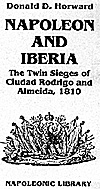 Professor Horward's publications include: The Battle of Bussaco: Massena vs. Wellington (1965, 1967); The French Campaign in Portugal, 1810-1811: An Account by Jean Jacques Pelet (1973); Napoleon and Iberia: the Twin Sieges of Ciudad Rodrigo and Almeida, 1810 (1984, 1995); and with Robert Doughty and Ira Bruber, Warfare in Western History (1996). He has also edited or co-edited six volumes of the papers of the Consortium on Revolutionary Europe, and contributed to ten books as well as compiled two bibliographies: The French Revolution Napoleon Collection at the Florida State University (1973) and Napoleonic Military History: A Bibliography (1986).
Professor Horward's publications include: The Battle of Bussaco: Massena vs. Wellington (1965, 1967); The French Campaign in Portugal, 1810-1811: An Account by Jean Jacques Pelet (1973); Napoleon and Iberia: the Twin Sieges of Ciudad Rodrigo and Almeida, 1810 (1984, 1995); and with Robert Doughty and Ira Bruber, Warfare in Western History (1996). He has also edited or co-edited six volumes of the papers of the Consortium on Revolutionary Europe, and contributed to ten books as well as compiled two bibliographies: The French Revolution Napoleon Collection at the Florida State University (1973) and Napoleonic Military History: A Bibliography (1986).
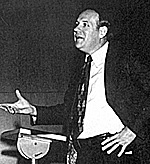 How would you compare the state of the historical profession in the U.S. today to when you began your career?
How would you compare the state of the historical profession in the U.S. today to when you began your career?
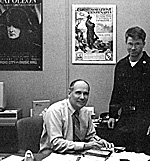 I recall that you hosted several eventful meetings at Tallahassee, didn't you?
I recall that you hosted several eventful meetings at Tallahassee, didn't you?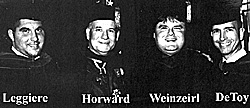 This interest in the Napoleonic period has continued throughout the world. In 1993 I presented a paper at Clare College, Cambridge University, to commemorate the 700th anniversary of the Anglo-Portuguese Alliance which certainly played a major role in the Peninsular War. In 1995 another paper was presented at the Fourth International Congress on Napoleonic Europe (the third was canceled by Hitler in 1938) at Austerlitz, sponsored by the Czech Military Academy and Masayrk University in the Czech Republic.
This interest in the Napoleonic period has continued throughout the world. In 1993 I presented a paper at Clare College, Cambridge University, to commemorate the 700th anniversary of the Anglo-Portuguese Alliance which certainly played a major role in the Peninsular War. In 1995 another paper was presented at the Fourth International Congress on Napoleonic Europe (the third was canceled by Hitler in 1938) at Austerlitz, sponsored by the Czech Military Academy and Masayrk University in the Czech Republic.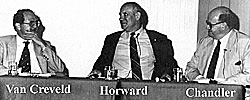 I entitled my interview with David Chandler: "Marlborough and Napoleon". What do you think I should call yours?
I entitled my interview with David Chandler: "Marlborough and Napoleon". What do you think I should call yours?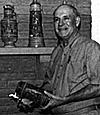 Looking back over your career, how do you see the significance of your total contribution to the field?
Looking back over your career, how do you see the significance of your total contribution to the field?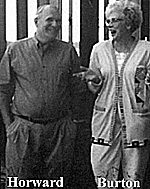 Who do you think are today's leading Napoleonic scholars/writers in the U.S. and abroad?
Who do you think are today's leading Napoleonic scholars/writers in the U.S. and abroad?
Back to Table of Contents -- Napoleon #11
Back to Napoleon List of Issues
Back to MagWeb Master Magazine List
© Copyright 1997 by Emperor's Press.
This article appears in MagWeb (Magazine Web) on the Internet World Wide Web.
The full text and graphics from other military history magazines and gaming magazines are available at http://www.magweb.com